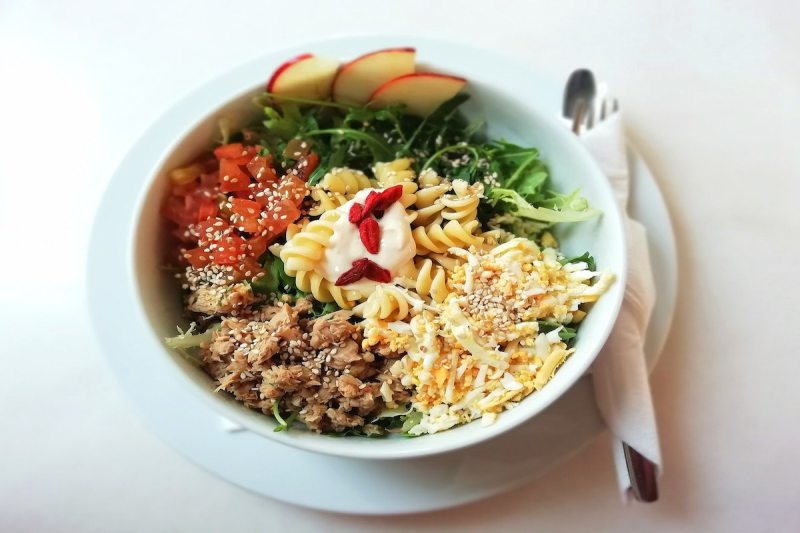Intermittent fasting has gained significant attention as a way to manage weight, improve health, and simplify eating habits. But is intermittent fasting healthy, and does it live up to the hype?
This eating method alternates between periods of eating and fasting, with claims ranging from better blood sugar control to enhanced mental clarity. However, it’s not without potential drawbacks, including challenges related to hunger and sustainability.
We’ve outlined everything you need to know about intermittent fasting, including science-backed benefits and possible downsides. Continue reading to get the gist.
What is intermittent fasting?

Intermittent fasting is a dietary strategy that alternates between periods of eating and fasting. Unlike traditional diets that focus on what you eat, intermittent fasting emphasizes when you eat.
This approach is believed to promote weight loss, improve metabolic health, and enhance cellular repair processes like autophagy. Intermittent fasting, however, is not a one-size-fits-all plan — success often depends on your lifestyle, preferences, and health goals.
What are the types of intermittent fasting?

Intermittent fasting comes in several styles, and each style has a unique approach to balancing eating and fasting periods. Here are some of the most common ones:
- 16/8 method: This popular option involves fasting for 16 hours and eating within an 8-hour window, such as 12 p.m. to 8 p.m. It’s simple and often aligns with natural meal times. For example, you could stop eating four hours before bed, sleep eight hours, and then eat four hours after waking up. Of course, this is still difficult, but because it aligns with natural eating patterns, it seems more feasible.
- 5:2 method: This one involves eating normally for five days a week, then consuming only 500 to 600 calories on two non-consecutive days.
- Eat-stop-eat: Here, you do a full 24-hour fast once or twice a week. For example, you could stop eating after dinner one day and break your fast the next evening.
- Alternate-day fasting: You alternate between eating normally one day and significantly restricting calories (or fasting entirely) the next.
- Warrior diet: This option involves eating small snacks of fruits and vegetables during the day and consuming one large meal at night, mimicking ancient warrior lifestyles.
- Spontaneous meal skipping: This method allows you to skip meals when you’re not hungry or too busy to eat rather than following a strict schedule.
Your preference and the restrictions you can consistently maintain will determine the type of intermittent practice you choose. It is ideal to start with smaller, hourly fasts before getting into the day-long ones.
Day-long fasts can be quite fatiguing and difficult, but your body gets used to the lack of food as you fast more often. Hence, slowly easing into things is essential to give yourself time to adjust.
Benefits of intermittent fasting

Supports weight loss
Intermittent fasting can help reduce calorie intake by naturally limiting eating windows. It may also enhance fat-burning by lowering insulin levels and increasing metabolic flexibility, allowing the body to switch to burning stored fat for energy.
Harvard Health Publishing suggests that “intermittent fasting has a similar or even modest benefit over traditional calorie-restriction dieting for weight loss.”
Improves metabolic health
Fasting can improve markers of metabolic health, such as insulin sensitivity, blood sugar regulation, and cholesterol levels. These changes reduce the risk of conditions like type 2 diabetes and heart disease.
Promotes cellular repair
During fasting, the body initiates processes like autophagy — a cellular “clean-up” system that removes damaged cells and regenerates new ones. This repair mechanism supports longevity and may lower the risk of chronic diseases.
Boosts brain health
Intermittent fasting may enhance brain function by increasing the production of brain-derived neurotrophic factor (BDNF), a protein linked to learning and memory. Fasting may also reduce the risk of neurodegenerative diseases like Alzheimer’s and Parkinson’s.
Are there any downsides to intermittent fasting?

Intermittent fasting has myriad benefits, but it also has some downsides. Here are some of them:
- Hunger and fatigue: Fasting periods can lead to increased hunger, low energy levels, and difficulty concentrating, especially during the adjustment phase. This may affect productivity and mood.
- Risk of overeating: Some people may overcompensate during eating windows, consuming excessive calories or unhealthy foods, which can counteract the benefits of fasting.
- Nutritional deficiencies: Restricting eating times can make it challenging to consume enough essential nutrients, especially if meal planning isn’t prioritized.
- Social disruption potential: Fasting schedules can make it difficult to participate in social events that revolve around food, potentially leading to feelings of isolation or inconvenience.
- Sleep disturbance: Fasting too close to bedtime or having an irregular eating schedule can sometimes disrupt sleep patterns.
Can you eat or drink anything during the fasting periods?

During intermittent fasting, the goal is to avoid consuming foods or beverages that contain calories, as this would disrupt the fasted state. However, there are several drinks you can enjoy that support hydration and even enhance the fasting process.
Water is the most essential choice, as staying hydrated is crucial. You can also add lemon slices for flavor without breaking your fast. Black coffee during intermittent fasting is another popular option, as it contains virtually no calories and may boost fat-burning and mental focus thanks to its caffeine content.
Similarly, unsweetened tea, such as herbal, green, black, or white tea, is acceptable and can help suppress appetite. Sparkling water, as long as it’s unflavored and calorie-free, provides a refreshing alternative, and a small amount of apple cider vinegar diluted in water may support your digestive system without impacting your fast.
To stay in a fasted state, it’s important to avoid drinks that contain calories. This includes sugary sodas, juices, and smoothies, as well as coffee or tea with cream, milk, or sweeteners. Alcohol is also off-limits, as it contains calories and can interfere with the benefits of fasting.
Frequently asked questions

Is it harmful to do intermittent fasting every day?
Intermittent fasting is generally safe for most people when done daily, especially with methods like the 16/8 approach. However, excessive fasting or skipping meals without proper nutrition can be harmful. Always consult a healthcare provider if unsure.
How long should you do intermittent fasting?
The intermittent fasting duration depends on your goals and how well your body adapts. Some people use intermittent fasting as a short-term tool for weight loss, while others incorporate it into their lifestyle for long-term health benefits. Start with a method that feels sustainable and adjust as needed.




